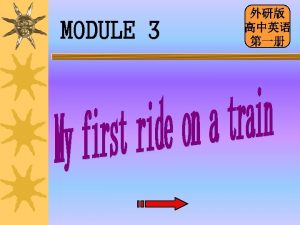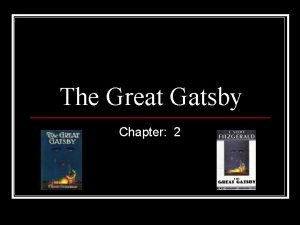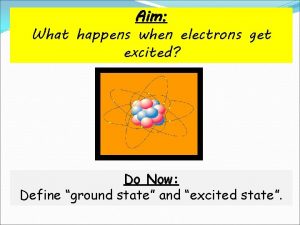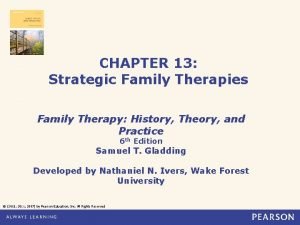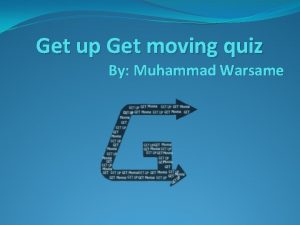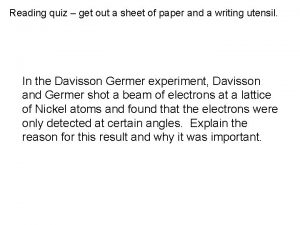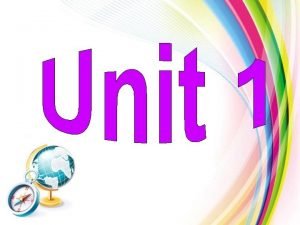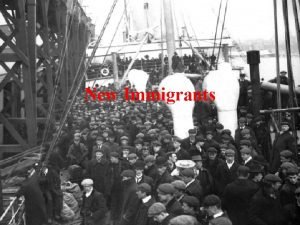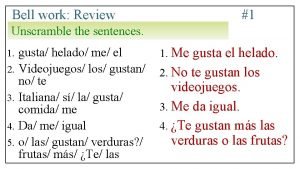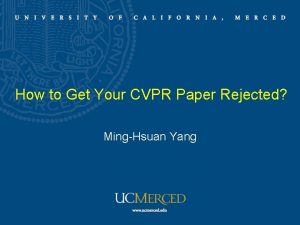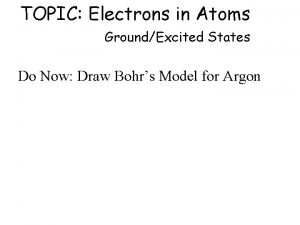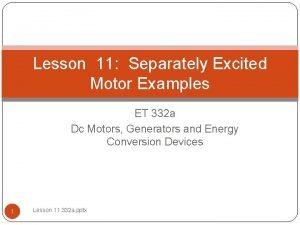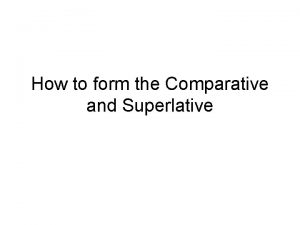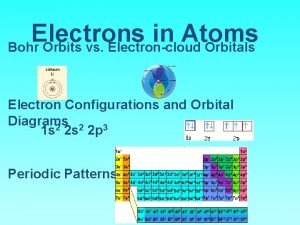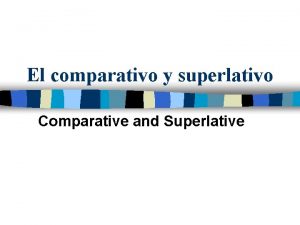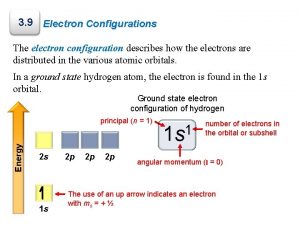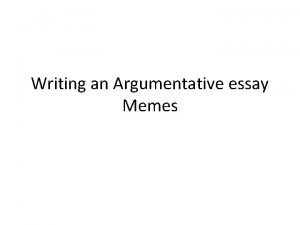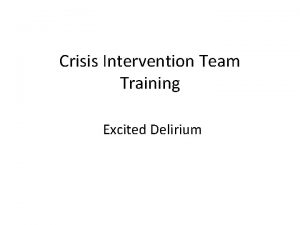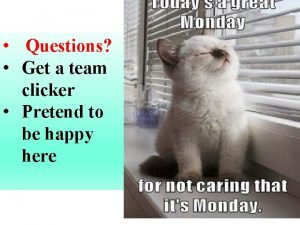GET EXCITED OR AT LEAST PRETEND Meet your


















































- Slides: 50

GET EXCITED (OR AT LEAST PRETEND)!!

Meet your teams! Team 1 Team 2 Team 3 Is this guy for real?

Warm-up Question 1 • What was the Emancipation Proclamation? Who did it apply to (groups of people & states)?

Warm-up Answer 1 • The Emancipation Proclamation was the decree issued by Lincoln after the Union victory at Antietam declaring all slaves in rebelling states to be free. • It applied to Southern, Confederate States still in rebellion. It also applied to slaves and slaveholders. • It did not apply to slave-holding Border States.

Warm-up Question 2 • What is passive resistance to slavery? Give some examples.

Warm-up Answer 2 • Passive resistance is “under the table” resistance to slavery. • Examples include: – Breaking tools – Work stoppages – Theft – Arson – Faking injury/sickness

Warm-up Question 3 • What is active resistance to slavery? Give some examples.

Warm-up Answer 3 Active resistance to slavery is open resistance. Examples include: • Running away • Leading a rebellion • Murdering master • Challenging slavery in court • Petition

Warm-up Question 4 • What is Gettysburg? Why was it important?

Warm-up Answer 4 • Gettysburg was the largest and bloodiest battle of the Civil War. It occurred when Lee invaded the North (Pennsylvania) in order to influence the close election between Lincoln and Mc. Clellan. • It is important because after Lee was decisively defeated, he was basically in retreat for the rest of the war.

Question 1 • What is Vicksburg? Why is it important?

Answer 1 Vicksburg was the last Confederate stronghold on the Mississippi. The Union finally captured it after a month’s seige. It is important because, once Vicksburg fell, the Mississippi belonged to the Union, the Confederacy was cut in half, the Anaconda tightened, the war in the west was over, and Grant (along with his troops) were transferred to the battle of the capitals.

Question 2 • Who is George Mc. Clellan? Why is he important?

Answer 2 • Mc. Clellan served twice as Lincoln’s head generals. After he was fired a second time, he became Lincolns chief political rival. He ran against Lincoln as a peace candidate in the 1864 election and almost won. If he had, the Civil War might have had a very different outcome.

Question 3 • Who was Gen. Sherman? Why is he important?

Answer 3 • Gen. Sherman was Grant’s second-incommand (a Union general). He is most famous for his march across Georgia which cut the Confederacy in half. • This move boxed Lee in and lead to his surrender.

Question 4 • Who is Gen. Grant? Why is he important?

Answer 4 • Gen. Grant was the commanding Union general in the western war for the Mississippi. He was the only general that gave Lincoln a string of victories. • Lincoln transferred him to command the battle of capitals after the battles of Vicksburg and Gettysburg. • He defeated Lee and accepted his surrender.

Question 5 • What is “conscription? ” Which side use it?

Answer 5 • Conscription is the military draft, where all eligible men are put in a lottery and names are drawn at random. Those drawn are required to join the military. • Both sides used the draft.

Question 6 • What is “voluntary enlistment? ”

Answer 6 When someone signs up for military service without being drafted.

Question 7 • Who was the “Great Emancipator? ” What does this mean?

Answer 7 • Lincoln is often called “The Great Emancipator. ” • Emancipation means to free from slavery. • An emancipator is the one who frees the slaves.

Question 8 • What are “Sherman’s Neckties? ”

Answer 8 • These were railroad ties that were bent into knots around trees during Sherman’s March to the Sea through Georgia.

Question 9 • What were some of the challenges African. Americans faced when they enlisted in the Union Army?

Answer 9 • Some challenges include: • Various kinds of discrimination, such as unequal pay and bad jobs. • Prejudice, such as commanders thinking they were cowardly, lazy, or thieves.

Question 10 • What was Sherman’s March to the Sea? How did this affect the South’s ability to continue fighting?

Answer 10 • It was a devastating march through the state of Georgia where everything of value was burned, destroyed, or stolen by the Union army. • This effected the Confederacy’s ability to fight by destroying the Confederate’s ability to supply its army. It also wrecked what was left of the Confederate economy. It also caused desertions from the Confederate army as men left to try to protect their homes.

Question 11 • Why was Lincoln almost defeated during his re -election campaign? Why did he ultimately win?

Answer 11 Many people in the North were tired of being at war. They believed the war had lasted too long and cost too many lives. As long as Lincoln was president, the war would continue. Lincoln was re-elected because the Union began to decisively win the war after Vicksburg and Gettysburg.

Question 12 • How did Lincolns view on slavery change over the course of the Civil War?

Answer 12 • Before the war, he believed in the gradual freeing of the slaves by buying out their owners and sending the freed slaves to Africa. • When the war started, he believed he did not have the power to get rid of slavery where it already existed, only in places to which it wanted to expand. • By the end of the war, he believed that slavery must be destroyed because it is what had ripped the nation apart. He issued the Emancipation Proclamation freeing slaves in the South. He also invited African. Americans into the military.

Question 13 • There are many reasons why African. Americans voluntarily enlisted in the Union army. – What are some physical motives for joining?

Answer 13 • • • Monthly pay Signing bonus Bounty at end of service Fresh supplies Government support for families

Question 14 • There are many reasons why African. Americans voluntarily enlisted in the Union army. – What are some reasons for joining that were harder to measure?

Answer 14 • • • Revenge against masters Fight for freedom and equality Patriotic duty Honor and Glory Protection

Question 15 • How did African-Americans contribute toward the victory of the Union over the South?

Answer 15 • First, they joined the Union army in great numbers. These new infusion of soldiers tipped the scales in favor of the Union in the war by giving the army the manpower it needed to overwhelm the South. • Many African-American units, such as the M. A. 54 th fought bravely in battle (Ft. Wagner) and contributed to Union victories late in the war. • African-Americans worked hard a the undesirable jobs that helped the Union army to function, such as gravediggers, ditch-diggers, cooks, etc. • African-American women were often used as spies.

Question 16 • The Union victories at Gettysburg happened within days of each other. Why did these two victories mark a final turning point in the Civil War?

Answer 16 • Gettysburg stopped Lee’s invasion of the South. It was the first major Union victory in the Battle of the Capitals. After this, Lee was permanently in retreat. • Vicksburg was the last Confederate stronghold on the Mississippi. When it fell the War in the West was done and Union troops and commanders could be transferred eastward in order to win the Battle of the Capitals and finish Lee off.

Question • Who is Gen. Lee? Why is he important?

Answer • General Lee was the leading commander of the Confederate Army. He was important because he lead the South to a string of impressive victories early in the Civil War, which almost convinced the Union that the war was unwinnable.

Question • What is Ft. Wagner? Why is it important?

Answer • Ft. Wagner was one of the forts that protected Charleston Harbor, SC. It was important because it was the battle in which the M. A. 54 th participated in a frontal assault and became one of the most decorated units of the war. • It was also important because Charleston harbor was one of the last ports left to the Confederacy.

Question • What is total warfare? Who used it?

Answer • Total Warfare is the military strategy of not attacking your enemy directly, but instead trying to destroy the enemy’s ability and will to fight a war. This includes burning, destroying, or stealing anything that might help the enemy. • Gen. Sherman made this strategy famous in his march to the sea across Georgia.

Question • Who ran against Lincoln in during his reelection campaign? What did Lincoln’s opponent promise to do if elected?

Answer • Gen. George Mc. Clellan ran against Lincoln in 1864. He was a peace candidate that promised an end to the war. He was willing to go to the negotiation table with the South and discuss an Amendment to the U. S. Constitution which guaranteed the future of slavery.
 Get into/out of
Get into/out of What is the theme of the poem
What is the theme of the poem How does myrtle react to tom’s arrival?
How does myrtle react to tom’s arrival? God be with you until we meet again
God be with you until we meet again Excited state of neon
Excited state of neon Excited to get to know you
Excited to get to know you Excited to get started
Excited to get started Pretend modus
Pretend modus How to write a i am poem
How to write a i am poem Pretend techniques in strategic family therapy
Pretend techniques in strategic family therapy Part of speech great
Part of speech great Get up get moving quiz
Get up get moving quiz Get up get moving quiz
Get up get moving quiz Get up get moving
Get up get moving Repetition in pseudocode
Repetition in pseudocode Get focused get results
Get focused get results Get up get moving quiz
Get up get moving quiz A:nice to meet you b
A:nice to meet you b Hi, good morning, nice to meet you! *
Hi, good morning, nice to meet you! * Meet your meat
Meet your meat Nice to meet you what's your name
Nice to meet you what's your name Give us your hungry your tired your poor
Give us your hungry your tired your poor Your answer is too short (use at least 9 words).
Your answer is too short (use at least 9 words). In your notebook write three paragraphs
In your notebook write three paragraphs Karakia for blessing
Karakia for blessing 5 sentences about my best friend
5 sentences about my best friend Shivaji university exam password
Shivaji university exam password How to gain parents trust back
How to gain parents trust back How to get your cvpr paper rejected
How to get your cvpr paper rejected Get your thinking caps on
Get your thinking caps on Somebody once asked could i spare some change for gas
Somebody once asked could i spare some change for gas Confirm your email now and get 5 minutes as a gift!
Confirm your email now and get 5 minutes as a gift! Come and listen
Come and listen Yidarton.net/to get your prize
Yidarton.net/to get your prize Get your mind right meaning
Get your mind right meaning Excited state electron configuration
Excited state electron configuration My very excited mother planets
My very excited mother planets Tictle
Tictle A book of over 1 000 knock-knock jokes author's purpose
A book of over 1 000 knock-knock jokes author's purpose Et 332
Et 332 Atom model
Atom model Tall comparative superlative
Tall comparative superlative Simile for excited
Simile for excited What is the difference between an orbital and a shell
What is the difference between an orbital and a shell Superlativo de blanca
Superlativo de blanca Superlative degree of excited
Superlative degree of excited Excited state electron configuration
Excited state electron configuration Show not tell phrases
Show not tell phrases Teacher good morning everybody
Teacher good morning everybody Sinusoidally excited linear circuit
Sinusoidally excited linear circuit Betrayal thematic statement
Betrayal thematic statement
